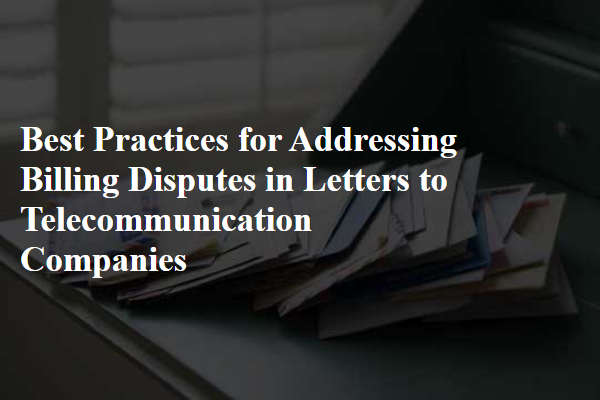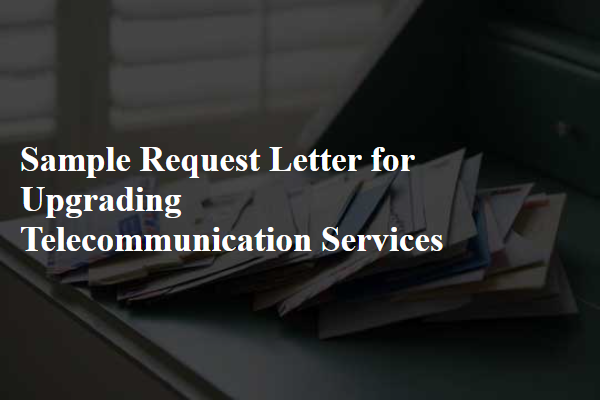
Clearly outline the specific billing issue with detailed account information to facilitate a swift resolution. Maintain a professional and concise tone, providing any supporting documentation such as previous bills, payment receipts, or correspondence. Request a clear explanation or adjustment, and specify a reasonable deadline for response to ensure timely handling of the dispute.
Clear Statement of Billing Dispute Issues
Effectively addressing billing disputes in letters to telecommunication companies requires clarity and professionalism. Following best practices ensures a prompt and accurate resolution to billing concerns.
- Provide Detailed Account Information - Include your account number, billing period, and specific charges in question to help the company locate your account swiftly.
- Clearly State the Dispute - Explain the nature of the billing error or charge discrepancy concisely and accurately to avoid misunderstandings.
- Request Specific Action - Specify the resolution you seek, such as a refund, adjustment, or investigation, to guide the company's response effectively.
Reference to Relevant Account Details
```htmlHow can customers effectively address billing disputes in letters to telecommunication companies? Clearly state the specific billing issue and provide relevant account details to ensure prompt identification. Include copies of bills, payment records, and any prior correspondence to support your claim.
What tone should be used when writing a billing dispute letter to a telecommunication provider? Maintain a professional and polite tone to facilitate constructive communication. Avoid emotionally charged language to increase the likelihood of a favorable response.
What key information must be included in a billing dispute letter to telecommunication companies? Include your full name, account number, date of the disputed bill, and a detailed explanation of the billing error. Request a timely investigation and resolution to expedite the process.
How important is it to follow up after sending a billing dispute letter to a telecom company? Follow-up communications demonstrate seriousness and help track the resolution status. Use email or phone calls within 7-10 days to maintain momentum on your dispute.
Are there any legal considerations to keep in mind when disputing telecommunication bills in writing? Familiarize yourself with the Fair Credit Billing Act (FCBA) and relevant consumer protection laws. These regulations often require companies to investigate disputes promptly and protect consumers from unfair charges.
```Detailed Description of Discrepancies
Effectively addressing billing disputes in letters to telecommunication companies requires clear communication and detailed documentation. Adhering to best practices ensures quicker resolution and minimizes misunderstandings.
- Be Specific and Concise - Clearly state the disputed charges and provide relevant dates to help the company identify the issue promptly.
- Include Supporting Evidence - Attach copies of bills, payment receipts, and any correspondence related to the dispute for verification.
- Request a Clear Resolution - Specify the desired outcome, such as a corrected bill or refund, and ask for a written response within a reasonable timeframe.
Chronological Timeline of Events
Effectively addressing billing disputes in letters to telecommunication companies requires clarity, accuracy, and professionalism. A well-structured letter helps resolve issues promptly and maintains a positive relationship with the service provider.
- Provide detailed account information - Include your account number, billing period, and specific disputed charges to facilitate quick identification.
- Clearly state the issue - Describe the billing error or discrepancy concisely and provide any supporting evidence such as previous bills or payment receipts.
- Request specific action - Specify the resolution you seek, such as a credit adjustment or reversal of charges, to guide the company's response effectively.
Maintaining a polite and factual tone increases the likelihood of a successful outcome in billing dispute communications.
Attachments and Supporting Documentation
Clearly state the billing issue with specific account details and dates to ensure accurate identification. Include copies of relevant bills and payment records to support your claim and facilitate verification. Request a prompt investigation and resolution, specifying preferred contact methods for follow-up communication.
Explicit Request for Resolution Actions
| Best Practice | Description | Example |
|---|---|---|
| Clear Identification | Include account number, customer ID, and billing period to help the telecommunication company quickly locate the account and understand the dispute context. | "Account Number: 123456789; Billing Period: March 2024" |
| Concise Description of Dispute | State the exact nature of the billing discrepancy, such as incorrect charges, unauthorized fees, or service not rendered. | "I was charged twice for my April 2024 internet service." |
| Supporting Evidence | Attach copies of relevant bills, payment receipts, or previous correspondence to support your claim and strengthen your case. | "Attached is a copy of the April invoice and proof of prior payment." |
| Request for Resolution | Clearly specify the expected remedy, such as a refund, credit adjustment, or correction of the bill. | "I kindly request a refund for the duplicate charge of $50." |
| Polite and Professional Tone | Maintain respectful language to foster a cooperative response and avoid escalation. | "I appreciate your assistance in resolving this matter promptly." |
| Include Contact Information | Provide up-to-date phone number and email address for clarifications or follow-ups. | "Please contact me at john.doe@email.com or (123) 456-7890." |
| Timely Submission | Send the dispute letter promptly after noticing the issue to comply with company policies and increase the likelihood of a favorable outcome. | "Dispute submitted within 30 days of bill receipt." |
| Request Confirmation | Ask for acknowledgment of receipt and confirmation that the dispute is under review. | "Please confirm receipt of this letter and advise on the investigation status." |
Citing Applicable Contract Terms or Policies
When addressing billing disputes in letters to telecommunication companies, clearly state the account details and specify the disputed charges. Provide any relevant evidence, such as previous bills or payment receipts, to support your claim.
Maintain a professional and concise tone throughout the letter to ensure clarity and seriousness. Request a prompt investigation and resolution while asking for confirmation of receipt and follow-up actions. Keep a copy of the letter and all related correspondence for your records and future reference.
Professional and Respectful Tone
Clearly state the account details, billing period, and the specific charge in dispute to ensure accurate identification by the telecommunication company. Provide supporting evidence such as previous bills, receipts, or service agreements to substantiate your claim. Request a timely resolution and include your preferred contact information for follow-up communication.
Specific Deadlines for Response
When addressing billing disputes in letters to telecommunication companies, clearly state the account information and the specific charges in question. Providing detailed evidence such as call logs, invoices, or payment receipts improves the chances of a swift resolution.
Maintain a professional and concise tone, avoiding emotional language to ensure clarity and effectiveness. Request a specific action or resolution and include a deadline for response to facilitate timely follow-up.
Contact Information for Further Communication
Billing disputes with telecommunication companies require clear and concise communication to ensure swift resolution. Providing detailed account information and specific charges in dispute helps establish the context for the company's review.
Using a professional and polite tone increases the likelihood of a positive response from customer service representatives. Including relevant documents, such as billing statements and previous correspondence, strengthens the credibility of the dispute claim.



Comments